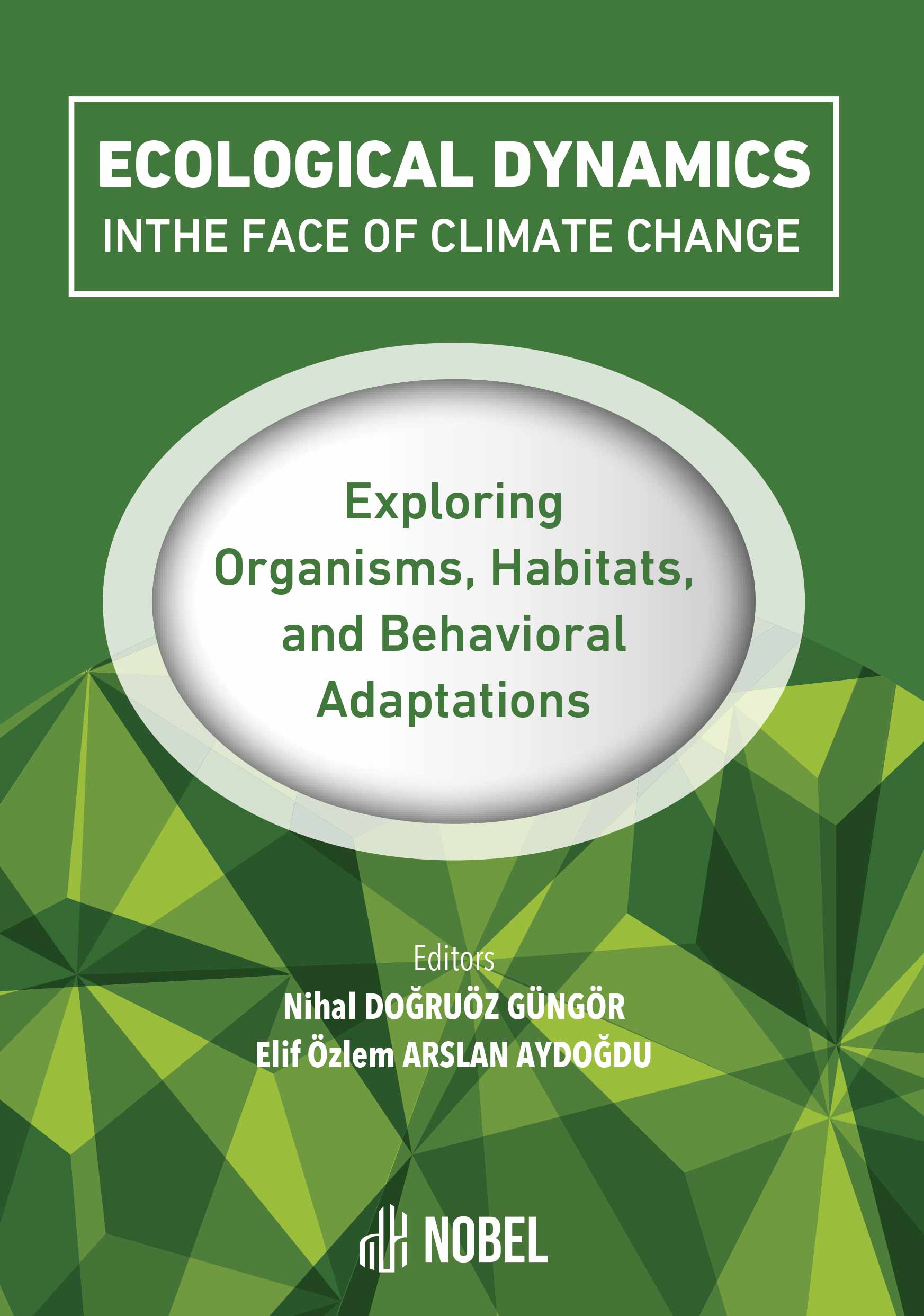The Ecological Role of Phytoplankton and the Drivers of Harmful Algal Blooms: Responses to Climate-Induced Stressors in Marine Ecosystems
Muharrem Balci (Author), Rabia Sezgin (Author), Ugur Atakli (Author)
Release Date: 2024-05-31
Phytoplankton, a group of single-celled organisms capable of photosynthesis, are vital to marine ecosystems due to their primary production and role in biogeochemical cycles. They adapt to diverse environments and utilize complex nutritional strategies. Phytoplankton contribute to the global carbon cycle through carbon fixation and sequestration, particularly by diatoms and coccolithophores. However, climate change and [...]
Media Type
Buy from
Price may vary by retailers
| Work Type | Book Chapter |
|---|---|
| Published in | Ecological Dynamics in the Face of Climate Change |
| First Page | 75 |
| Last Page | 88 |
| DOI | https://doi.org/10.69860/nobel.9786053359258.5 |
| Page Count | 14 |
| Copyright Holder | Nobel Tıp Kitabevleri |
| License | https://nobelpub.com/publish-with-us/copyright-and-licensing |
Muharrem Balci (Author)
Professor, Istanbul Universty
https://orcid.org/0000-0001-9373-6647
3Muharrem BALCI is a Professor in the Hydrobiology Division of Biology Department at Istanbul University. He obtained his Ph.D. degree from Istanbul University, Institute of Science, Hydrobiology Program in 2013.
His main research areas include aquatic microbial ecology, water quality analysis, and also phytoplankton (diatom, dinoflagellate, and cyanobacteria), dinoflagellate cyst cultures for ecologic and biotechnological applications, PCR-based cloning, phylogenetic, metagenomics and environmental DNA analysis.
Rabia Sezgin (Author)
Istanbul Universty
https://orcid.org/0000-0002-6321-2954
3Rabia Sezgin is a PhD student at the Department of Biology, Department of Hydrobiology, Istanbul University. She completed her master’s degree in the same department in 2022. Her research interests are phytoplankton culture, single cell isolation, phylogenetics and molecular biology.
Ugur Atakli (Author)
Istanbul Universty
https://orcid.org/0009-0003-0764-2727
3Uğur Ataklı is a biologist at Istanbul University, Turkey. He graduated in 2023 from Istanbul University, Department of Biology. He is currently working on his master’s degree in the Department of Hydrobiology at the same university. His research interests include hydrobiology, marine ecology, environmental biology and biotechnology.
Azam F, Cho BC. Bacterial utilization of organic matter in the sea. in "Ecology of microbial communities", 41th symposium of the society for general microbiology, M. Fletcher, T.R.G. Gray and J.G. Jones (eds.). Cambridge University Press. 1987:261-281.
Herrero A, Flores E. The cyanobacteria: Molecular biology, genomics, and evolution. Caister Academis Press. 2008. https://ci.nii.ac.jp/ncid/BA85265346.
Freely RA, Doney SC, Cooley SR. Ocean acidification: Present conditions and future changer in a high CO2 world. Oceanography. 2009.
Cullen JJ. Observation and prediction of harmful algal blooms. In: Babin M, Roesler CS, Cullen JJ (eds) Real-time Coastal Observing Systems for Marine Ecosystem Dynamics and Harmful Algal Blooms: Theory, Instrumentation and Modelling. 2008;1;1–41.
Tomas CR. Identifying marine phytoplankton. Elsevier. 1997.
Tomas CR, Throndsen J, Heimdal BR. Marine Phytoplankton: A guide to naked flagellates and coccolithophorids. Academic Press. 2012. http://ci.nii.ac.jp/ncid/BA21078597.
John DM, Whitton BA, Brook AJ, Museum NH, Society BP. The freshwater algal flora of the British Isles: An Identification Guide to Freshwater and Terrestrial Algae. Cambridge University Press. 2002.
Hoppenrath M, Elbrächter M, Drebes G. Marine Phytoplankton: Selected Microphytoplankton Species from the North Sea Around Helgoland and Sylt. Schweizerbart Sche Vlgsb. 2009.
Kraberg A, Baumann M, Dürselen CD, Meeresforschung AWIFPU. Coastal phytoplankton: Photo guide for Northern European seas. 2010. http://ci.nii.ac.jp/ncid/BB1052711X.
Trainer VL, Hickey B, Bates SS. Toxic diatoms. In: P.J. Walsh, S.L. Smith, L.E. Fleming, H. Solo-Gabriele, and W.H. Gerwick (eds.). Oceans and human health: risks and remedies from the sea. Elsevier Science Publishers. 2008:219-237.
Aligizaki K. Spread of potentially toxic benthic dinoflagellates in the Mediterranean Sea: A response to climate change?. Phytoplankton Response to Mediterranean Environmental Change. 2009.
Raymont JEG. Plankton & Productivity in the oceans: Volume 1: Phytoplankton. Elsevier. 2014.
Larsson U, Nyberg S, Zakrisson A, et al. Baltic Sea phytoplankton : Long-term variability of major groups and primary production in spring and summer related to nutrients and temperature. DIVA. https://urn.kb.se/resolve?urn=urn%3Anbn%3Ase%3Asu%3Adiva-113188. Published 2015.
Smayda, TJ. Phytoplankton species succession. in I. Morris (ed.) The physiological ecology of phytoplankton. University of California Press. 1980:493–570.
Von Liebig JF. Die organische Chemie in ihrer Anwendung auf Agricultur und Physiologie. 1840.
Acton QA. Issues in Information Science Research: 2011 edition. Scholarly Editions; 2012.
Kocataş A. Oceanoloji. In: Bornova, İzmir, Ege Üniversitesi Kitaplar Serisi. 1999;114:35-38.
Yoo KI. Population dynamics of dinoflagellate community in Masan Bay with a note on the impact of environmental parameters.
Balci M, Balkis N. Assessment of phytoplankton and environmental variables for water quality and trophic state classification in the Gemlik Gulf, Marmara Sea (Turkey).
| onix_3.0::thoth | Thoth ONIX 3.0 |
|---|---|
| onix_3.0::project_muse | Project MUSE ONIX 3.0 |
| onix_3.0::oapen | OAPEN ONIX 3.0 |
| onix_3.0::jstor | JSTOR ONIX 3.0 |
| onix_3.0::google_books | Google Books ONIX 3.0 |
| onix_3.0::overdrive | OverDrive ONIX 3.0 |
| onix_2.1::ebsco_host | EBSCO Host ONIX 2.1 |
| csv::thoth | Thoth CSV |
| json::thoth | Thoth JSON |
| kbart::oclc | OCLC KBART |
| bibtex::thoth | Thoth BibTeX |
| doideposit::crossref | CrossRef DOI deposit |
| onix_2.1::proquest_ebrary | ProQuest Ebrary ONIX 2.1 |
| marc21record::thoth | Thoth MARC 21 Record |
| marc21markup::thoth | Thoth MARC 21 Markup |
| marc21xml::thoth | Thoth MARC 21 XML |

